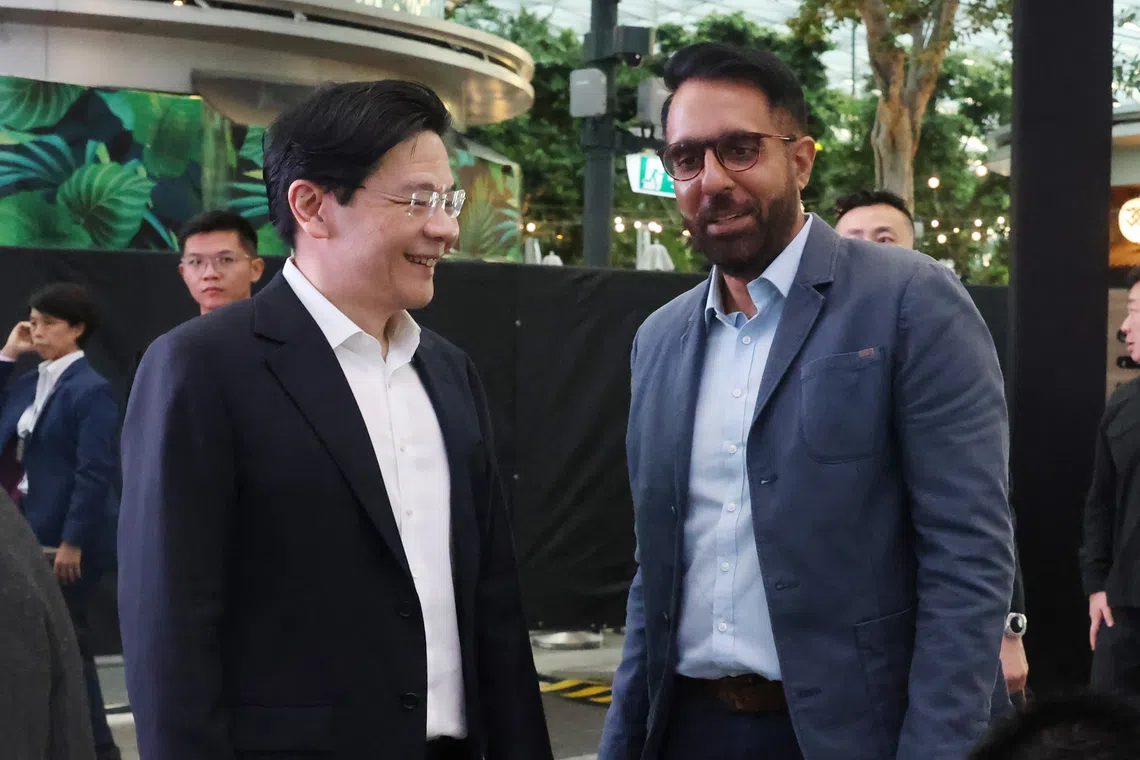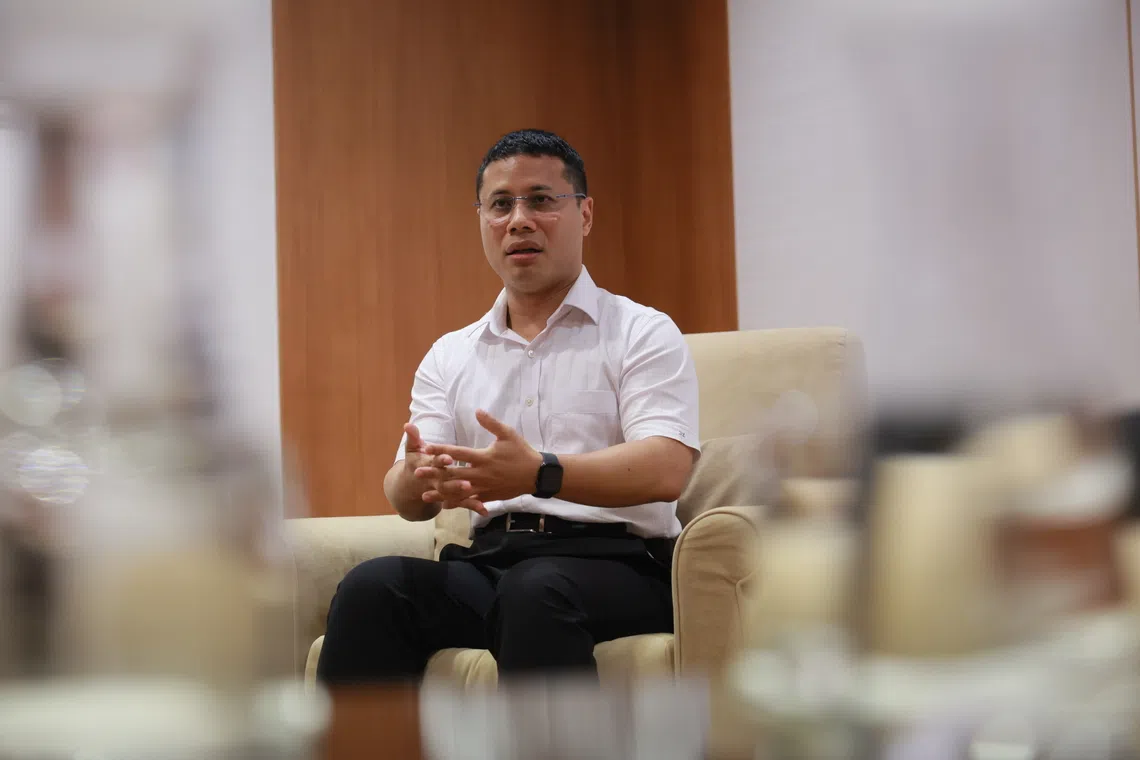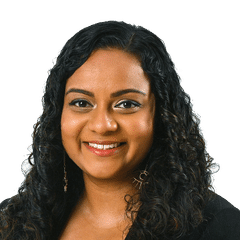Current balance in Parliament can shift, evolve at each GE: Desmond Lee
Sign up now: Get ST's newsletters delivered to your inbox

At the 2025 General Election, the PAP, under PM Lawrence Wong (left) secured 65.57 per cent of the popular vote, while the Workers’ Party under Mr Pritam Singh emerged as the main opposition.
PHOTO: ST FILE
Follow topic:
- Singaporeans chose a balance at GE2025 - a PAP government with a strong, renewed mandate and a stronger WP presence. This is a dynamic situation that evolves at each election, said Desmond Lee.
- The PAP acknowledges Singaporeans' desire for a good opposition and stable government, and looks forward to robust, constructive parliamentary debates.
- PAP aims to engage all Singaporeans and opposition parties, addressing concerns through various channels, while rejecting divisive identity politics.
AI generated
SINGAPORE - A PAP government with a strong, renewed mandate and a stronger WP presence in Parliament is the “balance” that Singaporeans have chosen for now, but this is a dynamic and evolving situation, said PAP chairman Desmond Lee.
This balance can shift at each general election depending on factors such as the Government’s and opposition’s performance in the prior term, he said in his first interview with the media
“(It) is not a permanent equilibrium... It’s ultimately for Singaporeans to decide what they want as a balance, in terms of governance versus checks and balance,” he said.
Apart from whether the PAP government delivered, and whether the opposition served as a “high-quality check and balance” and proposed good ideas, the electorate will see if other political parties had come to the fore, he added.
The candidates the various political parties put up for election, as well as the domestic and international geopolitical situation, will also have an impact on this balance.
At the 2025 General Election, PAP secured 65.57 per cent of the popular vote
The result showed that Singaporeans want a good, loyal opposition presence, and the PAP accepts this, said Mr Lee, who is also Education Minister.
At the same time, Singaporeans know instinctively that stable government is needed in order to establish the socio-economic conditions within Singapore – and also the geopolitical relationships with the wider world – for the Republic to thrive, he said.
Post-election, the PAP now looks forward to robust, constructive debates in the new term of Parliament, starting on Sept 22 with the debate on the President’s Address. Every month thereafter, there will also be parliamentary sessions where important issues are raised and debated, he added.
“We may agree to disagree on issues, but we also want to be able to grapple, and let Singaporeans understand the trade-offs that we grapple (with) in order to keep Singapore going.”
Asked for his assessment of the recent polls, and whether the PAP achieved the result it did due to a tight control over the election agenda, Mr Lee said GE2025 was strongly contested and there were many opportunities for all political parties to communicate what they stood for, on both mainstream media and social media platforms.
“In a way, every party pushed forward their agenda, and we addressed many of them through the cut and thrust of the debate during the GE,” he said. “As well as before GE, in the lead-up, already you saw many parties rolling out their manifestos and debating them both on social media and in the physical space.”
Mr Lee said the PAP saw an emergence during the election of identity politics and attempts to polarise society through foreign interference, and that it had to call this out.
He noted that there were also some local elements who sought to exploit race and religion and who urged Singaporeans to vote on those lines, which can inflame fault lines, particularly given the heightened emotions of an election campaign.
There is no place for that in Singapore, he said, adding: “You’ve seen that played up in politics in many countries, where the politics has not just become highly contestable but also highly divisive and polarising.
“Fortunately, we believe the majority of Singaporeans rejected divisive politics. They closed ranks, they focused on what was important for Singapore as a whole.”

Mr Desmond Lee speaking during his first interview with the media as PAP chairman since taking on the mantle in May 2025.
ST PHOTO: GAVIN FOO
But while the PAP secured a decisive victory – it bucked a trend of dips in its vote share each time a new prime minister took office – a post-election survey found a drop in credibility scores for the ruling party.
A survey by the Institute of Policy Studies
Commenting on how these two seemingly opposite results could be reconciled, Mr Lee noted that there were dips across the board for all political parties, and this was perhaps an opportunity to assess people’s overall perception of the political arena and politics here.
“It’s important for us not just to reflect on the PAP and what more we need to do to maintain and strengthen our trust in our relationships with Singaporeans and voters, but also how, as a body politic, we retain Singaporeans’ trust in our politics as a whole,” he said.
When asked how the PAP would engage with opposition parties that do not have seats in Parliament, Mr Lee said such parties continue to make their presence felt – whether through traditional means such as taking to the airwaves and going into the community, or through newer channels such as messaging apps and online platforms.
“We will continue to engage all Singaporeans, and when the opposition parties are active on the ground in our constituencies, we also will engage them,” he said.
He added: “It’s not possible to tackle every single one of these feedback and ideas, but there will be a number that will frame themselves into issues of concern, or good ideas that should be taken seriously, and on that account we will do so through various channels and different platforms.”
Mr Lee, 47, was the PAP assistant secretary-general before he succeeded former deputy prime minister Heng Swee Keat as PAP chairman
The role has traditionally gone to more experienced individuals – Mr Lee’s appointment makes him the youngest PAP chairman since Mr Ong Teng Cheong, who took on the post in 1981 when he was 45.
Mr Lee said he sees the chairmanship as a role with a rallying focus – to mobilise the party around the new leadership, to serve Singaporeans, and also to bring in new blood and a diversity of views.
“(The job is to) rally the party to strengthen in... the way we engage different groups, the way in which we communicate with Singaporeans, and the way in which we organise ourselves – not just in our branches on the ground, but also in cyberspace,” he said.


